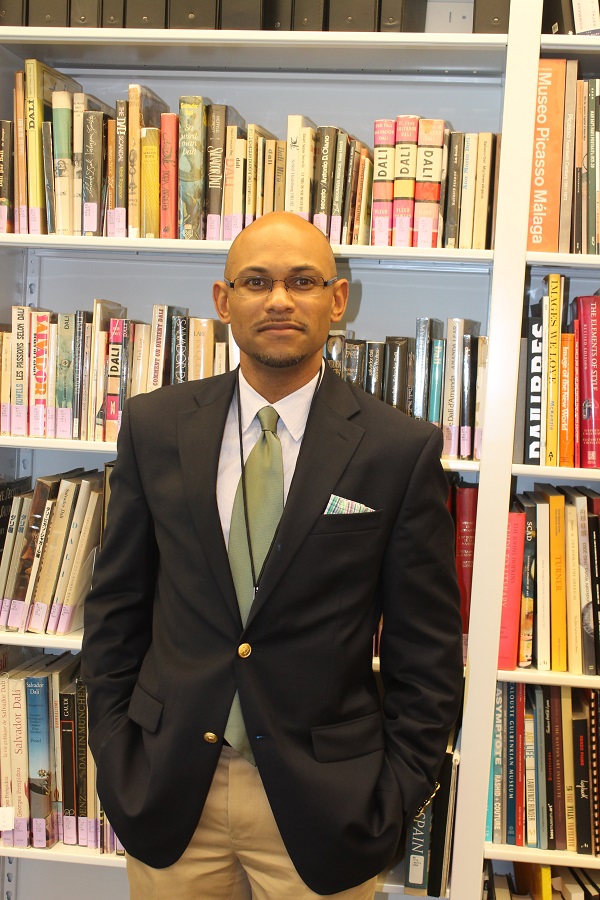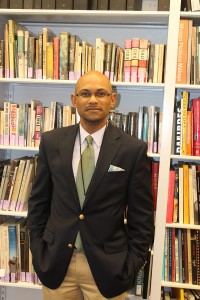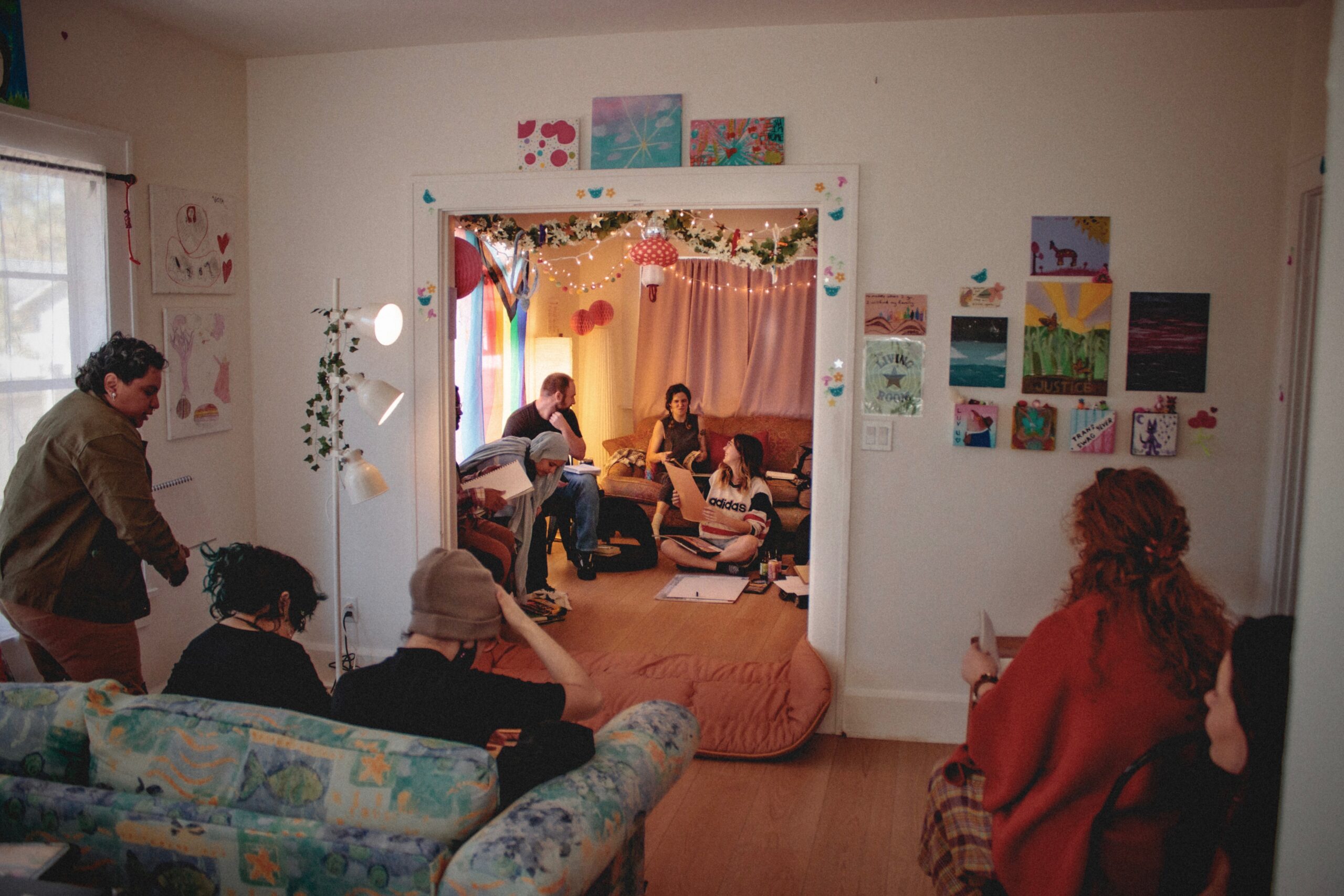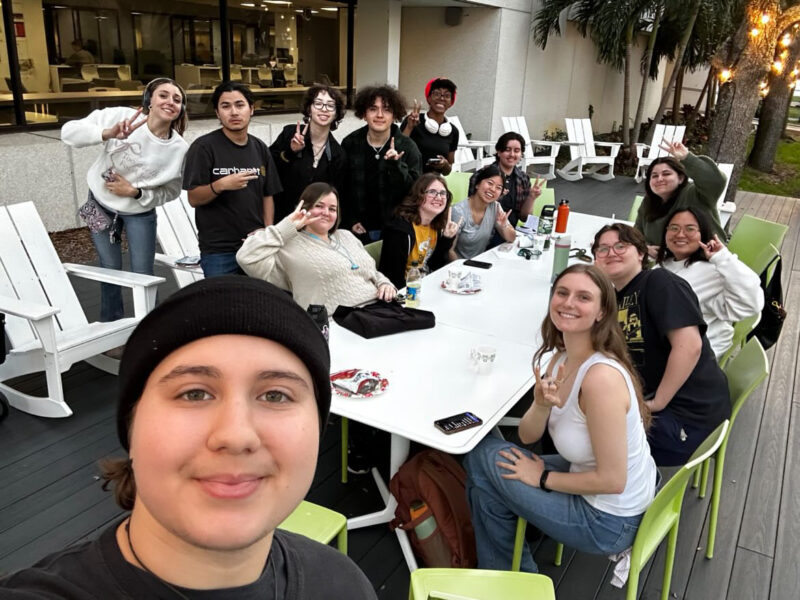Professor Francis Tobienne Jr., or Prof T. as he is known to his students, is on a scholarly quest for knowledge, self and a better understanding of a personal inspiration, Salvador Dalí.
A native of the Carribean island St. Croix, Prof. T. grew up with easy access to a spread of cultures and languages. These foundations shaped his idea of using language and epistemology as tools for discovering the unknown.
While attending St. Croix Country Day School, he was shown a documentary. On the screen, a man with a pointed mustache tipped with flowers molded a piece of foil in the likeness of his own face. The man was Salvador Dalí.
“This is a monstrous genius. It needs excavation,” he recalls thinking at the time.
This dialectic ideal, or idea that allowed for the monstrous to simultaneously be genius, never left Prof. T.’s mind as he went on to major in biology and chemistry. Though he enjoyed these subjects, he continually came across inexplicable gaps in texts he was working with. There were hidden meanings in the language and origin of science.
Here he found the law of contraries at play again in his thinking.
“There is another side to every idea. I found myself wondering ‘why do we believe what we believe?’ Often the starting belief provokes and warrants criticism,” he said.
He decided that he wanted to look at traditional works, accepted as the norm, and disrupt them in their certainty. Instead of looking at science as a singular discipline for explaining the unknown, he sought to question it and connect it with other forms of human inquiry. Studying the occult became a natural path for him to follow in his desire to understand the whole picture.
“Instead of looking at apples to oranges, it’s apples to boats. That’s what magic did for me,” he said.
At the same time, he felt that the occult lacked a historical voice. There were stones to be upturned on the subject.
“There wasn’t much being said for its intellectual history. There’s more to it than what goes bump in the night,” he said.
At Purdue University, Prof. Tobienne earned a Ph. D. in medieval literary studies specializing in Middle English language and literature as well as literary criticism, philosophy, theory and cultural studies. His continuing research interests span a great number of subjects, including late medieval and early modern social, cultural and intellectual history, religion and ethics as philosophy.
He also furthered his linguistic ability, bringing his total language count up to eight. This arsenal has allowed him to dissolve words and culture barriers that surround undiscovered knowledge. He has concluded that “good research is not between A and B; good research is between A and 1.”
The publication of his first book, “The Position of Magic in Selected Medieval Spanish Texts,” came about during this time. It was his master’s thesis at Purdue. When he was first approached for publishing, he thought it was a hoax. Now four years later, he has been tapped for a second edition.
On a personal level, his studies have led him to explore his own Spanish descent. Spain played a prominent role in preserving occult history during the Middle Ages, a subject explored in his first book. The Dalí book will act as a tie connecting his heritage, his previous studies of Spain and his personal idol.
This endeavor is tentatively titeld “Dalí’s Medievalism: La Brujera de Las Mujeres (“Women as Bewitching Agents”).” The book will examine women in Dalí’s art as sources of supernatural inspiration. Gala was Dalí’s muse, but according to Prof. T. she wasn’t the only one.
“Women have a very particular light in his art. This book will be based off of the question, ‘How many female bewitching agents are there for Dalí? How many Galas are there?” he said.
Of note is that the book will not solely study Dalí’s paintings. It will also examine his large body of literature, work that is often lost in the shadow of his visual art.
“He would have considered himself foremost a writer. He thought himself a horrible painter,” said Prof. T.
These days, Prof. T. spends a lot of time in the special collections library at The Dalí Museum, a scholars-only access room. There he can mull over rare texts and compile his book in peace. He has also joined the Dalí lecture circuit.
As astute as he is, Prof. T. places great value on making use of knowledge once it has been attained.
“It would be a shame to garner so much knowledge and keep it to yourself. It’s more than being a Renaissance man, it’s being relevant. To be able to foster and contribute to your community,” he said.
He hopes to be a bridging agent between differing parties of knowledge, like literature and history, or science and religion.
“Imagine having access to all nomenclature and being able to disarm the difference. We’ve lost the idea of breaking bread, of discourse,” he said.
When not teaching, his hobbies include wine tasting, tennis and traveling. His plans for the future include pursuing new and relevant studies in whatever form they appear— including religious studies and education at Harvard University and bioethics at Columbia University— and winning the Nobel Prize in both literature and peace. He currently teaches English studies at USF St. Petersburg, including classes on literature/film and the occult, medieval travel theory and monster theory.
Prof. Tobienne’s upcoming talks on the Dalí lecture circuit are “Dalí’s Ejaculation: Shame as Acrosomal Reaction” on Sept. 12, and “Dalí’s Sophia: Gala as Problematic Interior” on Dec. 12.
“Dalí’s Medievalism” is set to come out in fall 2014. There will be a signing at the Dalí Museum and at Barnes and Noble, and he hopes to appear on C-SPAN’s “Book TV.”
Editor’s note: this article has been updated since it appeared in print.




